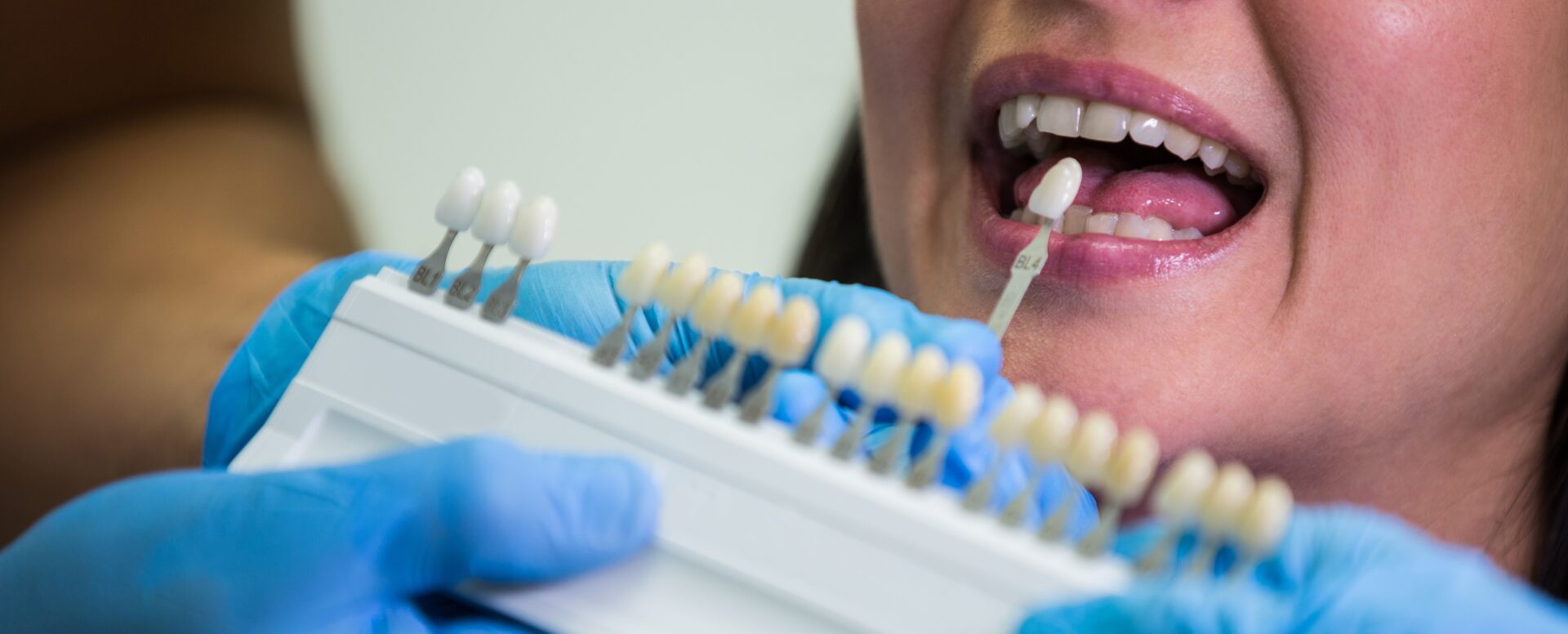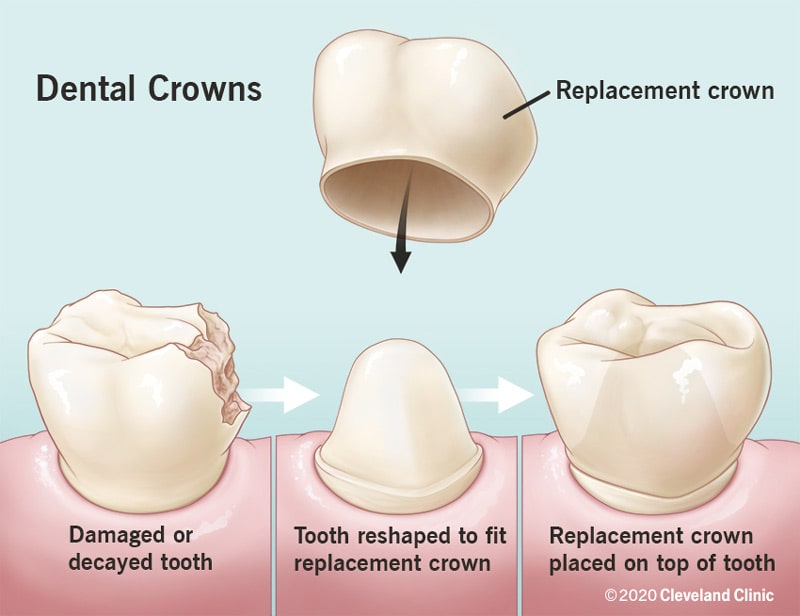
15 Apr A Guide to Dental Crown: Cap Your Tooth, Uncap Your Smile
A Guide to Dental Crown: Cap Your Tooth, Uncap Your Smile
By Island Hospital | Apr 15, 2024 12:00:00 PM
“Dental crowns look fake and never feel like real teeth.”
“Those who need dental crowns don’t take care of their teeth.”
“Dental crowns take weeks to receive.”
Are these your preconceptions about dental crowns?
If so, take a moment to read this article—it definitely offers fresh insights about dental crowns.
What are Dental Crowns?

Source: Cleveland Clinic
Dental crowns are tooth-shaped caps which encase entirely the visible part of a damaged tooth, serving as a protective shell.
With their lifelike appearance, dental crowns restore the structural integrity of teeth and improve their aesthetic appearance. This enables individuals to regain proper tooth function and improve their overall quality of life.
When Do You Need Dental Crowns?
You will need a dental crown if you have:
- Broken, chipped, or cracked teeth
- Teeth with large cavities (large holes)
- Severely worn-down or misshapen teeth
- Discolored teeth
- Undergone root canal treatment, dental bridge or dental implant
Types of Dental Crowns
The types of dental crowns can be categorized in three ways:
1. Types of Material
Dental crowns can be crafted from a single material or a combination of different materials, depending on the specific requirements.
The table below shows the single materials used to produce dental crowns.
| Material | Explanations |
|---|---|
| All-Porcelain Crowns | |
| All-Ceramic Crowns |
|
| Resin Crowns (a.k.a. all-resin crown and composite resin crown | |
| Metal Crowns (a.k.a. all-metal crowns and full-metal crowns) | |
| Stainless Steel Crowns (SSC) |
Combinations of different materials can also be used to create dental circles to leverage the advantages of multiple materials.
| Material | Explanations |
|---|---|
| Porcelain- Fused-to-Metal Crown (PFM) | |
| Pressed Ceramic Crown |
2. Coverage of the Crown
Depending on the degree of damage to your tooth, your dentist will choose between a partial dental crown and a full dental crown.
A partial dental crown, also known as an onlay or three-quarter crown, is recommended when significant tooth structure is lost, but the biting surface remains intact.
It covers and protects at least one cusp while preserving the natural biting surface.
In contrast, a full dental crown completely encases the visible portion from the biting surface to the gum line.
It is often used for severely damaged teeth with significant decay, fractures, large fillings, root canal treatment, discoloration, or misshapenness.
3. Fabrication Methods
Different fabrication methods for dental crowns vary in their completion time and cost.
If you’re on a budget and willing to make multiple visits, traditional lab-fabricated crowns are a more affordable option.
This crown requires fabrication in a dental laboratory, so it requires a second visit for placement. While it may take longer, this option is generally more affordable.
Conversely, if you have a busy schedule and prefer fewer visits, you can consider one-day dental crowns (a.k.a. CEREC crown, same-day dental crown).
They utilize CAD/CAM technology (Computer-Aided Design/Computer-Aided Manufacturing) for in-office fabrication, bypassing the dental lab.

Although this results in a faster process, the cost of one-day dental crowns is typically higher due to the cost of the advanced equipment.
Remarkably, both types of crowns are strong and durable, typically lasting 10-15 years with proper oral hygiene.
Indeed, choosing the right dental crown can be overwhelming with so many options. Hence, it’s essential to consult with a professional dentist to assess your needs and recommend the most suitable crown material.
Procedures for Getting Dental Crowns
The procedures for obtaining dental crowns vary depending on the fabrication method used.
Traditional Dental Crowns (Lab-Fabricated)
Getting a traditional dental crown typically involves at least two visits to the dentist over a few weeks. Here’s a detailed look at what to expect:
First Appointment: The Initial Consultation
Firstly, the dentist will discuss your goals, examine your tooth, and take X-rays to identify any underlying issues that need to be addressed before crown placement.
After discussing your needs and desired outcomes for the new crown, the dentist will reshape your tooth by grinding its surface to accommodate the crown securely.
Depending on the extent of tooth structure loss, the dentist may need to build up the tooth core with a filling material first.
After reshaping your tooth, digital scans will then be taken using CAD/CAM technology to capture the dimensions required for fabricating the permanent crown at a dental laboratory.
Meanwhile, a temporary crown will be fitted to protect the prepared tooth.
Second Appointment: Permanent Crown Placement
Approximately 5-7 days later, you’ll return for the second appointment to have your permanent crown placed.
After removing the temporary crown and making minor adjustments (if needed), the permanent crown will be securely fitted onto the prepared tooth.
Third Appointment: Follow-Up Assessment
A brief follow-up visit occurs around 1-2 weeks later.
The dentist will evaluate the permanent crown’s function and ensure patient satisfaction with the treatment outcome.
One-Day Dental Crown
For patients seeking a convenient and time-saving option, the one-day dental crown is definitely your cup of tea!
Thanks to the CAD/CAM technology, your dental crown treatment can be done in just 1 visit, typically taking only 60-90 minutes from start to finish.
Steps for getting the one-day crown include:
1. Initial Consultation and Planning
The dentist will examine your tooth, take X-rays, and discuss your needs and desired outcomes for the new crown.
2. Tooth Preparation
Next, the dentist will reshape your tooth by grinding to fit the dental crown.
3. Digital Impressions
Then, the dentist will use an intraoral camera to capture digital images and measurements of the prepared tooth and surrounding teeth.
4. CAD/CAM Crown Design
The digital impressions are then uploaded to a computer program. Your dentist will then design and model your crown using the CAD software with the assistance of an on-site lab technician.
5. Crown Milling
Once the 3D crown design is finalized, the specifications are sent to an in-office milling machine. Your crown will be carved out of a solid ceramic block in under 15 minutes.
6. Permanent Placement
After the new crown is crafted, your dentist will check the fit, make any minor adjustments, and cement it securely onto your prepared tooth.
You can leave the dental clinic on the same day of your appointment with a durable, natural-looking restoration.
Caring for Your Dental Crown: Pre and Post-Treatment Guidelines
To ensure the longevity and success of your new crown, it’s essential to follow your dentist’s pre-treatment and post-treatment care instructions.
Here are some valuable tips to keep in mind:
Pre-Treatment
- Before getting a dental crown, ensure your teeth are thoroughly cleaned and undergo any necessary dental procedures, such as teeth whitening and scaling.
- Avoid biting into hard or sticky foods on the side with the temporary crown.
- Be gentle when brushing and flossing around the temporary crown.
- When flossing, pull the floss out from the side rather than snapping it up, as this could dislodge the temporary crown.
If the temporary dental crown does come loose or break, contact your dentist immediately to have it repaired or replaced before your next appointment.
Post-Treatment
Once your permanent crown is in place, proper maintenance and care are vital to its longevity and your overall oral health.
Here are some post-treatment care tips:
- Brush and floss your teeth gently yet thoroughly at least twice a day, paying special attention to the area around your new crown.
- Gently guide the floss between your teeth and pull it out from the side.
- Use a soft-bristled toothbrush and sensitivity-reducing toothpaste if you experience any discomfort.
- Avoid biting into hard, crunchy, or sticky foods, as these can crack or dislodge your crown.
- Wear a nightguard to protect your dental crown and other teeth from excessive wear and damage if you clench or grind your teeth at night.
- Take prescribed medication as directed by your dentist If you experience swelling, pain, or discomfort after receiving your crown.
- Attend all scheduled follow-up dental appointments to maintain the functionality of your dental crown.
Possible Complications with Dental Crowns
Dental crowns can solve numerous problems caused by decaying or damaged teeth. However, there are complications that you may encounter after receiving a crown:
| Fit and Bite Issues | Material and Structural Issues | Dental Health Issues |
|---|---|---|
When to Replace Dental Crowns?
Dental crowns are designed to be long-lasting restorations, but they are not immune to wear and tear over time.
Here are some common indicators that it’s time to replace your dental crown:
- Gum recession
- The crown has been used for more than 10 years
- Uneven or abnormal bite
- Tooth pain, swelling, or inflammation
If you notice any of the above signs or have concerns about the condition of your dental crown, schedule an appointment with your dentist for a thorough evaluation.
Alternatives to Dental Crowns
While dental crowns can restore damaged or decayed teeth, other solutions may be more suitable for some patients’ unique circumstances.
Explore these options to find the best solution aligning with your goals and dental condition:
Inlays and Onlays
Inlays and onlays provide conservative restorations for teeth with moderate damage but sufficient healthy structure.
Inlays repair damage within the tooth’s cusps (top edges), while onlays extend over one or more cusps.
Dental Veneers
Veneers can effectively conceal imperfections such as chips, cracks, gaps, or severe discoloration by adhering to the front tooth surfaces.
Dental Implants
If your tooth is severely decayed, cracked, or damaged beyond repair, your dentist may recommend extracting it and replacing it with a dental implant.
Dental implants are titanium artificial tooth roots surgically placed into the jawbone. They restore the missing tooth’s function and appearance.
Discover further insights on dental implants in our video featuring expertise from our oral and maxillofacial surgeon.
Tooth Extraction
If your tooth is severely infected or damaged to the point that it threatens the surrounding teeth and gums, removing the affected tooth may be a good option.
Prices of Dental Crowns
Typically, the cost of dental crowns in Malaysia ranges between RM 800 to RM 2,500 per crown. This varies based on the material used, tooth location, procedure complexity, dental clinic, and dentist expertise.
Kick Off Your Dental Journey with Island Hospital
A radiant, confident smile isn’t just about aesthetics – it speaks volumes about your well-being!
At Island Hospital, we understand the profound importance of oral health, which is why our dentistry department is committed to providing exceptional dental care tailored to patients of all ages.
Are you yearning to smile confidently or chew easily? Book an appointment with us today and experience the transformative power of dental crowns!
Should you have any questions, feel free to contact us.
FAQ
What is a dental crown?
Dental crowns are tooth-shaped caps which encase entirely the visible part of a damaged or decayed tooth, serving as a protective shell for those teeth.
Refer here for more information.
When do you need a dental crown?
Dentists often recommend dental crowns for the reasons below:
- Broken, chipped, or cracked teeth
- Teeth with large cavities (large holes)
- Severely worn-down or misshapen teeth
- Discolored teeth
- Crooked or unsightly teeth
- After undergoing root canal treatment, dental bridge or dental implant
- Teeth malocclusion (misalignment of teeth)
What are the types of dental crowns?
Dental crowns can be classified in three ways: material type, coverage and fabrication methods. Find out more in this section.
What are the procedures for getting a dental crown?
The procedure typically requires two appointments.
During the first visit, the tooth is prepared to fit the crown, and impressions are taken for the crown. The second visit involves cementing the permanent crown in place.
Refer here for more information.
How to care for my dental crown?
Proper oral hygiene, including brushing twice a day, flossing, and regular dental check-ups, is essential for maintaining the longevity of a dental crown. Also, avoid biting on hard objects to prevent damage to the crown.
Explore comprehensive guidance on caring for your dental crown before and after treatment in this section.
What are the possible complications of dental crowns?
Possible complications of dental crowns can be categorized into fit and bite issues, material and structural issues, and dental health issues.
Refer here for more information.
When should I replace my dental crown?
When you are experiencing gum recession, uneven or abnormal bite, tooth pain, tooth swelling, tooth inflammation, or your crown has been in place for over a decade, it’s time to consider replacing your dental crown.
Are there any alternatives to dental crowns?
Alternatives to dental crowns include inlays and onlays, dental veneers, root canals, dental implants and tooth extraction. Refer here for more information
How much is a dental crown in Malaysia?
Typically, the cost of placing dental crowns in Malaysia ranges between RM 800 to RM 2,500 per crown.
This varies depending on the specific dental clinic, the expertise of the dentist, the material used, the location of the tooth in the mouth, and the complexity of the procedure.











![[IH 2025] #33 ECG Test_Image 1 medical-machine-ecg-test](https://islandhospital.com/wp-content/uploads/2025/07/IH-2025-33-ECG-Test_Image-1-600x400.png)

